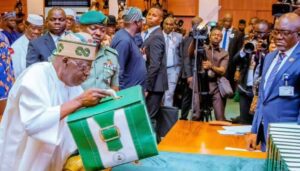
ASUU Strike: Airlines to suffer losses as NANS commences protest to ground airport operations
…Storms Murtala International airport in Lagos
…Threatens not to ‘back down,’ to ground activities in other airports, ports, major highways
…Tension as Court to rule Wednesday on FG’s suit seeking to compel ASUU back to work
…Reps to meet ASUU today
…Imo University pulls out, opens for academic session
By Moses Adeniyi, Deborah Onatunde, Ridwan Adekunle
Airlines in Nigeria are at the risk of suffering huge losses, should the negotiations and legal struggle between the Federal Government and the Academic Staff Union of Universities (ASUU) over the lingering strike of the latter fail to record success, as the National Association of Nigerian Students (NANS) on Monday commenced demonstration to ground operations at Airports across the Country.
The students on Monday reiterated that they would continue the protest and would not for any reason back down until the Federal Government takes the educational sector as a priority.
Students under the platform of National Association of Nigerian Students (NANS) on Monday stormed the Murtala Muhammed International Airport in Lagos to press down their demands for the government to resolve the prolonged ASUU strike.
Recall NANS had earlier said it will ground activities at the local and international airports across the country beginning from Monday, September 19 over the lingering strike.
The students on Monday who barricaded access roads to the Murtala Muhammed International Airport in Lagos held placards bearing inscriptions such as: “NANS SAY NO TO IMPUNITY,” “IF YOU HAVE MONEY FOR ELECTION FORM, YOU CAN FUND EDUCATION,” “NO NATION CAN DEVELOP WITHOUT GENUINE COMMITMENT TO EDUCATION.”
The situation caused gridlock along the axis as vehicular movement in and out of the airport was stalled amid the presence of a combined team of officers of the Lagos State Police Command, Rapid Response Squad, Lagos Airport Police Command, and other security agencies.
…Airlines suffer losses
Following blockage of the Lagos airport’s access roads, the Airline Operators of Nigeria (AON) on Monday lamented huge loss in their operations.
The blockage lasted for about 14 hours while the students chanted solidarity songs, insisting that they would continue until the strike is called off.
No fewer than 20 Police vans, and cars, along with over 100 operatives were on standby to monitor the development and avert any possible chaotic outbreak.
Although, there were no official cancellation of flight, the demonstration grounded vehicular movement, while forcing flight crews to trek down to the airport.
Impeding passengers from accessing the airport, some passengers were officially confirmed to have rescheduled their flight.
The development also led to delay of flight, a development that impacted negatively on the operators with losses.
…It is your struggle – Sowore
The presidential candidate of the African Action Congress and activist, Omoyele Sowore, also joined the Nigerian students in protest at the Murtala Muhammed International Airport, Lagos.
Sowore, who is a former President of NANS said at the protest ground that it was the Nigerian students that delivered independence to Nigeria in 1960.
“Nigerian students delivered independence to Nigeria in 1960, after they hijacked it and started using it against us. Nigerian students delivered the democracy we have today in 1999,” he said.
He also said it was important for the students to intensify their action saying, “this is your struggle.”
“I am a comrade and I remain a comrade forever, anything you need from us, let us know, but this is your struggle.” Sowore said.
He urged drivers, traders and well-meaning Nigerians to support the students’ struggle.
…It is their right – Osodeke
ASUU National President, Prof. Emmanuel Osodeke, in an interview with journalists praised the students for fighting for their rights.
“We commend NANS members for fighting for their rights. It is their right.
“The pro-chancellors are doing well too. We hope the government will listen to them because they (pro-chancellors) understand what is happening in the Nigerian universities,” he said.
… NANS further threatens to ground activities in NPA, Third Mainland Bridge
This is just as NANS has expressed its readiness to ground activities at the Nigerian Ports Authority (NPA) and the Third Mainland Bridge in Lagos.
In a statement signed by its Chairman, NANS National Taskforce on #EndASUUStrikeNow, Ojo Raymond, on Monday, the student body said it is ready to go on a week-long protest till the Federal Government accedes to its demands on the resolution of the strike action of ASUU.
The statement reads, “For the past few days, we have been protesting simultaneously round the states of the country to protest the continued ASUU strike which has lasted over seven months as a result of the ‘crass irresponsibility’ of the Federal Government to fulfil the terms of the agreement they willingly signed with ASUU.
“As an association, we are saddened by this development which has resulted in the closure of universities. And, this act, we believe, is deliberate by the Federal Government to deny the children of the common Nigerian access to quality education which violates the provisions of Chapter two of the Constitution of the Federal Republic of Nigeria, 1999 (as amended).
“We are using this medium to reiterate that this protest continues and that we will not for any reason back down until the Federal Government takes the educational sector as a priority.
“It is quite pathetic that the Federal Government is making use of the armed forces to quench a genuine struggle of Nigerian students despite the fact that these officers are also victims of the system whose children are also affected the same way we are.
“Today’s protest at Muritala Muhammed International Airport (Domestic and International wings) is just a preamble of what is to come in days ahead. And, we are informing the general public and the international community to pay serious attention to this struggle because we have been duly informed of the plan of the Federal Government to mobilise heavily against this protest.
“This was even witnessed today as anti-riot police officers and men of the Air Force were mobilised to attack us not until they were prevented by the mass of Nigerian students.
“We maintain that this protest shall last a week here in Lagos State and would be held simultaneously at the Muritala Muhammed International Airport, Nigerian Ports Authority and the third mainland bridge until our demands are met.”
This is just as NANS, Kwara Chapter, has threatened to embark on a peaceful protest and occupy Kwara airport, if the protracted ASUU strike is not suspended.
Mr Salman Issa, the NANS Kwara Chairman told journalists on Monday in Ilorin that members were just waiting for directives from its national secretariat.
Issa said once the national body of the students gave the order to the remaining 36 states, they would comply with the protest.
The Kwara NANS chairman was reacting to the blockage of the Murtala Mohammed Airport by the NANS, who stormed the Airport in Lagos to mount pressure on the government to resolve the seven-month industrial strike by the Academic Staff Union of Universities (ASUU).
“The directives of the protest is only binding on South West states which has been ongoing for the past five days.
“When given directive, we shall comply too,” he said.
…Tension as Court to rule Wednesday on FG’s suit seeking to compel ASUU back to work
The over seven months lingering strike by ASUU has gathered more controversies setting in confusion in the struggle to end the strike, as the Federal Government on Monday further pressed on compelling the Union to call off the strike through court order.
The Minister of Labour and Employment, Senator Chris Ngige, on Monday, said against the wide claim, the Federal Government did not drag but referred ASUU to court over the prolonged strike.
The Minister also regretted that the ASUU leadership does not understand the import of the Collective Bargain Agreement (CBA) negotiation alleging that they lack the nutrients of labour unionism.
Senator Ngige according to a statement by the Head of Press and Public Relations, Federal Ministry of Labour and Employment, Olajide Oshundun, said he would have failed in his duties if he didn’t refer the matter to the National Industrial Court of Nigeria (NICN) after seven months of protracted discussions and negotiations with the union, which failed.
The Minister who according to the Statement, spoke in Abuja, at the public presentation of the NLC at 40 publication, titled, “Contemporary History of Working Class Struggles,” said: “We have to counsel our brothers on negotiation. No negotiation is forced. You cannot say it is either you give me 200 per cent or I will continue my strike. There are laws guiding strikes. There are ILO principles on the right to strike. Nobody can take it away.
“But, there are things that follow it when you embark on strike as a worker and they are enshrined in the laws of our land. It is written in Trade Dispute Act. The ILO principles of strike talks about the right of a worker to withdraw services. There is also the right to picket. These are things that are done.
“Nigeria is respected in ILO. Some people said Federal Government took ASUU to court. No. I referred the matter after seven months of protracted discussions and negotiations that failed.”
Ngige recalled that he conciliated the dispute twice, first on February 22, one week after the commencement of the strike and some agreements were reached, and he brought everybody back on March 1, 2022 for another conciliation.
According to him, the only thing left was going back to the Federal Ministry of Education for the renegotiation of the 2013 agreement.
“Some people are saying 2009 agreement. The 2009 agreement has been renegotiated in 2013/2014 with the administration of former President Goodluck Jonathan. It is an anathema to use 2009 agreement.
“What is left is the renegotiation of their conditions of service, which is their right. It should be done but they are negotiating it under the principle of offer and acceptance and it broke down irretrievably there at the Federal Ministry of Education.
“That kick-started Section 17 of the Trade Dispute Act whereby the Minister of Labour and Employment, whoever it is, if you don’t transmit according to the dictates of Section 17, TDA, 2004, Laws of the Federation of Nigeria, you would have failed in your function. Therefore, I had to transmit.”
Ngige, however, said the transmission does not mean that the matter cannot be settled out of court.
He said either of the parties involved, the Federal Ministry of Education and ASUU could approach the NICN for an out-of-court settlement.
He maintained that Nigeria must be guided by laws and nobody should use the dispute to harangue anybody.
“The pro-chancellors said they want to do a counteroffer. I told them to do it as quickly as possible. Those are ingredients of labour relations. It is not enough if you misinform your membership. That should be a disservice. We should read through things as it is and interpret same way. If I leave them in education, they will stay there two years,” he said.
Regarding the issue of inflation and workers’ salary, Ngige assured that the Federal Government will adjust workers’ salaries to meet current realities.
He said although they inserted a provision in the 2019 Minimum Wage Act to review wages either next year or 2024, the Federal Government has started the review with ASUU.
He recalled that ASUU was at the stage of CBA negotiation with their employers, the Federal Ministry of Education when they embarked on strike.
As the lawsuit seeking to compel ASUU to stop the strike persist, the National Industrial Court (NIC) sitting in Abuja, would rule on Wednesday, on an application the Federal Government filed for an interlocutory order to compel the ASUU to call off its ongoing strike action.
Justice Polycarp Hamman adjourned the application for ruling after he entertained arguments from both counsels to FG, Mr James Igwe and that of ASUU, Mr Femi Falana, SAN.
FG’s lawyer, Igwe, at the resumed proceedings in the matter on Monday, prayed the court to order the striking lecturers to in the interim, return to the classroom, pending the determination of the suit.
He maintained that the matter was not only urgent but of great national interest as millions of students who have been at home since February 14, 2022 have to return to school.
“Sections 47 of the Trade Dispute Act gives your lordship the power to direct that no worker should continue to embark on strike pending when the applications are heard and determined,” he argued.
According to him, since the dispute between FG and the lecturers is already before the court for adjudication, it would be proper and in the interest of justice for the strike action to be called off.
On his part, ASUU’s lawyer, Mr. Falana, SAN, said the union was currently meeting with stakeholders to ensure an amicable resolution of all the controversial issues.
Falana, therefore, appealed to the government to cooperate with the union to resolve the issue.
He, however, faulted a referral the Minister of Labour and Employment, forwarded to the court for an order to compel ASUU to return to work.
Arguing that such referral amounted to a directive from the Minister to the court, he maintained that neither a Minister nor the President could wield such powers as to control a court of competent jurisdiction.
Recall that ASUU had on February 14, embarked on an initial four weeks strike. It subsequently extended the strike action indefinitely, on August 29, following the breakdown of negotiations between the aggrieved varsity lecturers and FG.
However, FG, said it wants the court to adjudicate on the propriety or otherwise of the strike action.
While ASUU accused FG of not being sincere in its negotiation, the government, through the Ministry of Labour and Employment, approached the court to compel the striking lecturers to return to the classroom.
Specifically, it urged the court to, “interpret in its entirety the provisions of Section 18 LFN 2004, especially as it applies to the cessation of strike once a trade dispute is apprehended by the Minister of Labour and Employment and conciliation is ongoing.”
As well as requested for, “an order of the Court for ASUU members to resume work in their various universities while the issues in dispute are being addressed by the NICN in consonance with the provisions of Section 18 (I) (b) of the TDA Cap T8. LFN 2004.”
…Reps to meet ASUU Today
Meanwhile, the House of Representatives is set to meet with the ASUU and other stakeholders towards a lasting solution to the lingering strike by the union.
This is contained in a statement by the Clerk of the House of Representatives, Mr Yahaya Danzaria, on Monday in Abuja, as he made it known that the meeting would be taking place on Tuesday at the National Assembly, the House of Reps wing.
He stated that the meeting with ASUU and other critical stakeholders was tailored towards providing a lasting solution to the persistent strike embarked upon by ASUU.
According to him, the House of Reps is sincerely concerned about the static strike which seems to have defied all attempt made to find solution.
He further maintained that the House was unsettled been that there had been no yielding agreement reached between the Federal Government and the striking University lecturers leading to negative consequence than good on the quality of education.
…Imo University pulls out, opens for academic session
Meanwhile, the management of the Imo state university (IMSU) on Monday pulled out from the ongoing over seven months strike, announcing that it has opened the university for academic activities.
The management made this known to journalists in Owerri, through the IMSU, Public Relations Officer, PRO, Ralph Njoku.



